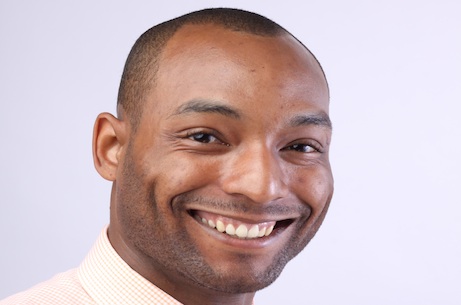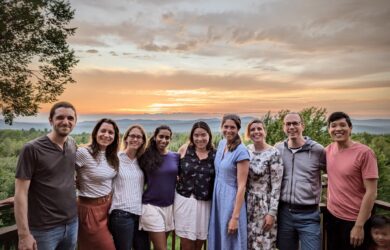
Anthony Hylick has started an education organisation which encourages people to reach their potential.
Anthony Hylick [2005] says being at the University of Cambridge literally changed his life and now he wants to help others fulfill their potential.
To that end he has published a book with his former college room-mates which aims to motivate young people to follow their passions. He has also formed an organisation whose aim is to inspire young people through education so that they can achieve their potential.
He says Cambridge was a key catalyst for him having confidence in following his own passion in bringing about change.
Anthony was born in the military town of Warner Robins in Georgia. His parents worked at the local airforce base, one of the largest in the US. He was very into sports such as American football and baseball as a young boy, but at around 10 he realised he could use his competitive drive in the classroom. Maths and science were his big interests.
By the time he was 13 he had been admitted onto the honours programme for maths. By the end of high school he had earned four college credits through taking an advanced placement in calculus. He also regularly played American football in front of crowds of up to 5,000 people and went on to play intramural sports at college level.
Focus
When he got to the Georgia Institute of Technology in Atlanta he had a very clear idea of what he wanted to learn and he feels that clarity and focus contributed to his success. He chose Computer Engineering. During his senior year at high school he was curious to find out how to turn an electrical signal into something that appeared on his desktop. He says he was interested in how computing worked from the bottom up.
He was not so clear about where he wanted to go for his postgraduate work, which made him more open to the email he received from the scholarship office towards the end of his degree. He was contacted because of his high GPA score and he attended various information sessions.
At the time he was just thinking about masters courses. He says the process of going through application form questions helped him to articulate what his passions were and what he was curious about. “My interest is in computer architecture and the design of computer systems. I am interested in the building blocks as well as how you make something cool,” he says.
He had never considered studying overseas – he had never been abroad before he came to Cambridge – but he won both a Gates Cambridge and Churchill scholarship as well as one from the National Science Foundation and two from US universities, including Berkeley where he would have worked under the professor who wrote the textbooks he studied at Georgia Institute of Technology.
Anthony took advice from his mentors and opted to do at PhD in Computer Science at Cambridge, a decision he says changed his life, but which he almost missed out on due to his fear of living abroad. “It’s an experience I struggle to put into words. It shaped who I am today,” he says.
Storage
His PhD focused on how to reduce the energy required by computer storage systems. He wrote an energy simulator for disc drives which could estimate how much energy any activity would take. What he learnt most from Cambridge, however, was a different more contemplative way of life. He would walk to and from the lab every day and think through his work. “Often I would solve the problem I was stumped on. It made me see things differently and ask questions about what is important,” he says.
He started writing a blog through which a common thread emerged about helping people make the most of their potential. During his vacations he would return home and talk to young people about his own experience of education, hoping to inspire them. He realised too that he was a good writer and more creative than he had thought and that creativity is possible in science just as it is in the arts.
When he left Cambridge he started working for IBM in Texas. He calls the research job his ‘dream job’. He liked the fact that the work was not just theoretical, but that he was actually building something practical and three years down the road he is still enjoying it.
Potential
During his time at Cambridge he set up equbed.org [pronounced ee-cubed] to try to get young people to make the most of their potential. Its website states: “Our mission is to rid our young people of limited thinking and create a new, limitless state of mind about success, happiness, achieving their dreams and goals, and, most importantly, living their passions. Through e-qubed, we introduce young people to the concept of Making Your Reality via the themes of enlightenment, empowerment, and encouragement.”
Since last year he has been working with six young male students, trying to keep them engaged in education through regular meetings to go through the curriculum and through other initiatives such as sports. The students had been part of a book club which had disbanded. Anthony has made a commitment to the students and their families that they will win a full scholarship to the university of their choice.
He also aims to show them the value of education. “There’s so much around these days about celebrities who are successful without education and young people can easily lose sight of why education is valuable. There’s also a lot of peer pressure, but global competition for jobs means they need to be better prepared,” he says.
He hopes to innovate further with equbed.org by taking on a broader range of students and making a film about his work. He has been shooting a documentary about his meetings with the six students which he says also helps keep them engaged.
Book
After he set up the organisation, Anthony also started working on a book with his college room-mates, called Plan “B” Sucks : Work on Your Dreams, Not Your Boss’s, which was released in July 2011. The book aims to inspire young people to take their future in their hands and go out and seek what they are passionate about. “So many people who leave university end up doing a job they don’t like or in which they feel undervalued. For some there is no progression,” he says. “The book aims to help them return to the dreams they originally had and demystify how you can make a living following your passion.”
Anthony started work on the book in 2009 while he was still at Cambridge and had three conference calls on it per week, including two at 3am in the morning and one at midnight on Sunday. “I was very dedicated and really believed in the project,” he says. “Putting pen to paper to express what I felt about so strongly was a good way to finish my PhD and my time at Cambridge.”
“The kind of work I have been doing on education since my time at Cambridge came as a result of my time at the University,” he says. “It gave me the confidence to do something different. It changed who I am and how I look at myself.”












